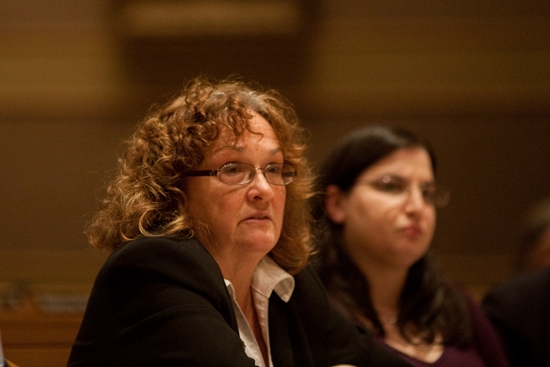
Thomas MacMillan Photo
Alderman Greg Smith (right) calls on the city to do more for minority contractors.
The city’s local-hiring requirements for small and minority-owned contractors are OK, builders and lawmakers said. But couldn’t they be even more local?
No can do, the city responded. That’s illegal.
That was one takeaway from a wide-ranging and at times testy three-hour hearing on how the city can create more business opportunities for local minority-owned businesses.
The hearing, held by the Board of Aldermen’s Legislation Committee on Monday night in City Hall’s Aldermanic Chamber, was the result of a request submitted by Dwight Alderman Greg Smith, along with Aldermen Charles Blango and Greg Morehead. The meeting ended with a vote to continue the conversation at the next meeting.
Despite all the construction planned and underway in town, minority contractors still aren’t seeing the business they ought to, the framers said. Contractors who testified agreed, and said the city’s efforts to promote hiring of small and minority-owned contractors in New Haven Country should be focused on just the city itself instead.

Snyder.
Can’t be done, Lil Snyder said later. She manages the economic development department’s Small Contractor Development program. The city can’t impose requirements that force developers to hire only city-based minority contractors, she said. New Haven was sued and lost when it tried to do that, she said.
The Small Contractor Development program was created in 2001, the result of a lawsuit in the 1990s that ruled that the city’s “set-aside” program was unconstitutional. That program had called for a percentage of city building work to be set aside for New Haven minorities.
The Small Contractor Development program now functions, legally, as follows: For all city construction projects in which the city is a party or the project is funded at least partly by city funds, developers must abide by certain hiring requirements. For jobs under $150,000, preference is given to small and minority- or female-owned businesses that are in New Haven County and registered with the Small Contractor Development program. There are about 200 such registered companies.
For projects greater than $150,000, 25 percent of subcontracted work has to go to registered small and minority-owned companies.
The program is an effort to redress the fact that studies had shown that African-American, Latino, and woman-owned firms were underrepresented in the awarding of city contracts.
As they kicked off Monday night’s discussion, Smith, Blango and Morehead said the Small Contractor Development program is not doing enough. Smith said he did a review of the percentages of work done by minority contractors on the recent $125 million 360 State mixed-use tower built downtown. He found that while over $9 million of contracts went to minority-owned businesses, only $345,000 of that went to New Haven contractors. The rest went to contractors based as far away as Hartford, or even Massachusetts, Smith said.
“These are the type of things that really concern me,” Smith said.
Snyder later said the city did not have the legal standing to impose hiring requirements on 360 State, since it wasn’t a project funded by city money.

Giordano.
Vin Giordano, the head of Giordano Construction, which has done a lot of school building work, told aldermen his company has met or exceeded the city’s minority-hiring requirements. He said it can be difficult to find contractors who meet the requirements. One of the challenges is not just hiring small and minority contractors, “but trying to employ good ones,” Giordano said. “That’s sometimes a challenge.” The list of qualifying contractors is just not “deep” enough, he said.
He promised to provide aldermen with details of how many minority contractors his company has hired and how much he has paid them.
Giordano was followed by George Cunningham, a contractor who had entered the chamber happily handing out his business card. He offered words of praise for Snyder and her program, which he said provided him with a mentorship that helped his painting business take off.
Larry Thomas, another African-American painting contractor, also praised the program and said it should be expanded.

Abdussabur.
Shafiq Abdussabur, a city cop who’s also an owner and project manager at Eco-Urban Pioneers (EUP) contracting company, said one obstacle small companies face is that major development projects are so big. Developers need to break the subcontracting work down into smaller chunks, he said.
He also called for city companies to have a leg up over other county companies. “What process can be put in place where New Haven companies can have preference?” he asked.

Ibrahim.
“How can we assure New Haven gets a fair shot?” asked Mubarakah Ibrahim, an owner at (EUP). (She and Abdussabur are married.)
At the end of the evening, a raft of city officials sat down to face the committee. They received marching orders from the committee chair, Hill Alderman Jorge Perez. He said he wanted a history of how and why the city was sued in the ‘90s; whether the city could create city-only hiring requirements, not just county-only; and if big contracts could be broken into smaller pieces to make them more feasible for small contractors.
“People are saying New Haven companies are not getting a piece of the pie,” Perez said. “We need to address that.”
The meeting ended with a vote by aldermen to continue the discussion at the next committee meeting, at which point lawmakers will hear from city officials.
Snyder said she had heard a lot of unrealistic talk about set-asides at the meeting. The city’s already been down that road, she said. “Legally we couldn’t do it.”